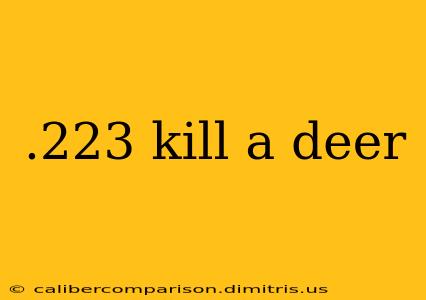The question of whether a .223 Remington can kill a deer is complex, encompassing ethical hunting practices, ballistic performance, and the realities of shot placement. While it's possible to harvest a deer with a .223, it's crucial to understand the limitations and potential ethical concerns involved. This isn't a simple yes or no answer; responsible hunting demands a nuanced understanding.
Ballistic Performance and Effective Range
The .223 Remington, a relatively small-caliber round, delivers significantly less kinetic energy than larger calibers commonly used for deer hunting, such as .30-06 or .308 Winchester. Its effectiveness hinges heavily on accurate shot placement. At closer ranges (under 150 yards), a well-placed shot, ideally in the heart/lung area, can be lethal. However, beyond this range, the bullet's energy drops considerably, increasing the likelihood of a wounded, and possibly suffering, animal. This dramatically impacts the ethical considerations.
Factors Influencing Lethality:
- Bullet Weight and Construction: Heavier bullets (55-77 grains) and those designed for hunting (with controlled expansion) are crucial for maximizing penetration and energy transfer. Standard FMJ (full metal jacket) bullets are generally less suitable for deer hunting due to their tendency to pass through without sufficient tissue damage.
- Shot Placement: Accurate shot placement is paramount. A marginal shot, even at close range, might not be sufficient to quickly and humanely dispatch the deer. A shot to the heart or lungs is crucial for swift incapacitation.
- Range: As previously mentioned, the effective range for ethically harvesting deer with a .223 is significantly shorter than with larger calibers. Exceeding this range increases the risk of a non-lethal or poorly placed shot.
Ethical Considerations in Deer Hunting
Ethical hunting places a premium on a clean, quick kill that minimizes the animal's suffering. Using a caliber that might not reliably produce this outcome raises significant ethical concerns. While a .223 might kill a deer, the increased risk of a wounded, fleeing animal makes it a less-than-ideal choice compared to calibers specifically designed for deer hunting. This is especially important for hunters who prioritize responsible wildlife management and ethical hunting practices.
Alternatives to .223 for Deer Hunting:
Hunters should strongly consider using calibers better suited for deer hunting. Larger calibers offer superior energy transfer, increasing the likelihood of a swift, humane kill, even with less-than-perfect shot placement. Choosing the right ammunition for the task is critical for ethical hunting.
Conclusion: Practicality and Responsible Choice
In conclusion, while technically possible, using a .223 to hunt deer presents ethical challenges and practical limitations. The risk of wounding the animal is significantly higher compared to using a cartridge specifically designed for big-game hunting. Responsible hunters prioritize a clean, quick kill, minimizing animal suffering. Choosing an appropriate caliber and practicing responsible shot placement are crucial components of ethical and successful hunting practices. Ultimately, the choice of caliber should reflect a commitment to ethical hunting and respect for the animal.

